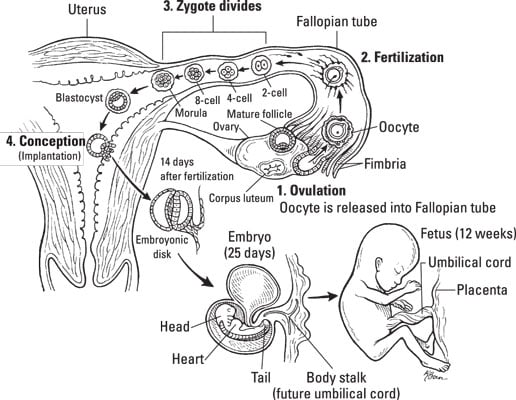Fetal Development Pictures Biology Diagrams Pre-embryonic Stage. The pre-embryonic, or germinal, period, about 14 days in length, is the shortest stage and lasts from conception to implantation of the zygote (fertilized egg) in the lining of the uterus.During this stage cell division with no significant growth produces a cluster of small cells that is the same size as the original zygote.

Your baby's basic anatomy is developing (they even have tiny earlobes now), but there's much more to come. Their embryonic tail has disappeared and they weigh just a fraction of an ounce but are about to start gaining weight fast. Fetal development: The 1st trimester. This page outlines the anatomy and physiology of pregnancy, focusing on the placenta, umbilical cord, and the maternal body's changes during gestation. During fetal development (seven months), organs mature and become functional; dramatic weight gain also occurs. The offspring increases greatly from <1" at 4 weeks to about 20" at 38

Reproduction and Development Biology Diagrams
This page shows some key events of human development during the fetal period (weeks 9 to 37) following fertilization. The long Fetal period (4x the embryonic period) is a time of extensive growth in size and mass as well as ongoing differentiation of organ systems established in the embryonic period. An atlas of topographical anatomy after

Figure 28.3.2 - Fetal Circulatory System: The fetal circulatory system includes three shunts to divert blood from undeveloped and partially functioning organs, as well as blood supply to and from the placenta. Other Organ Systems. During weeks 9-12 of fetal development, the brain continues to expand, the body elongates, and ossification 27.2 Development of Sexual Anatomy. 27.3 Physiology of the Female Sexual System. 27.4 Physiology of the Male Sexual System. 27.5 Physiology of Arousal and Orgasm. (This is a temporary responsibility of the embryonic liver that the bone marrow will assume during fetal development.) During weeks 4-5, the eye pits form, limb buds become

24.1: Overview of Embryology and Fetal Development Biology Diagrams
During weeks 9-12 of fetal development, the brain continues to expand, the body elongates, and ossification continues. Fetal movements are frequent during this period, but are jerky and not well-controlled. The bone marrow begins to take over the process of erythrocyte production—a task that the liver performed during the embryonic period.

Fetal development is how a fetus grows during pregnancy. It begins at conception and ends at birth. Many changes occur to the fetus and the pregnant person in this time. During this trimester, many people find out about the fetus's assigned sex. This is typically done during an anatomy scan (an ultrasound that checks physical development maternal diabetes can affect fetal pancreas development (increase in fetal islet beta cells). Gonadal Hormones testosterone - required during fetal development for external genital development and internal genital tract in male. estrogens - secreted inactive precursor converted to active form by placenta.
